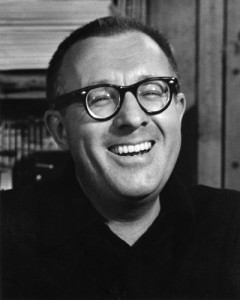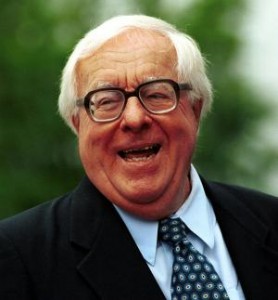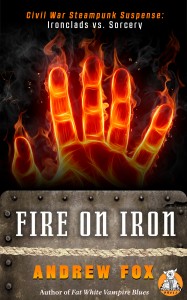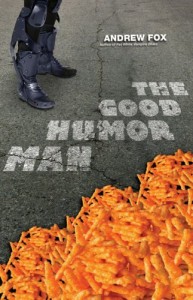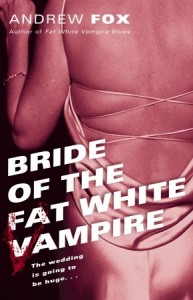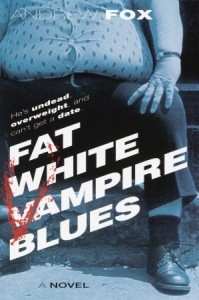My friend, Ray Bradbury, is now roaming the wind-swept midway of the Dark Carnival. He passed away at the age of 91 in Los Angeles on Tuesday, June 5, following what his publisher described as a long illness.
No, I never met Ray, apart from having had the pleasure of hearing him speak a couple of times (once at Tulane University in New Orleans, the second time at Comic Con International). Nor did I ever correspond with him. But I count him as a friend, as well as an influence and an inspiration.
One of the first science fiction books I ever asked for was Ray’s A Medicine for Melancholy. My father bought it for me at a newsstand/cigar store when I was in fifth grade, the day before I was due to get on a bus for my first-ever overnight trip away from my parents and home, a school-sponsored outing to Sea Camp down in the Florida Keys. The bus ride from North Miami Beach down to the Keys would take between two and three hours, and my father wanted me to have something to read on the journey. I picked out the Ballantine Books paperback because the collage of images on its front cover included a dinosaur. At that point, I didn’t know who Ray Bradbury was; I just wanted to read a book that had a dinosaur in it. No particular story of the twenty-two stories I read during those hours on the bus springs to mind; rather, what I recall from those hours I spent thirty-seven years ago is a sense of enchantment, of being gently drawn into a whole new universe of words and colors and textures, very much unlike anything I had read previously. The welcoming strangeness of the stories in the book was undoubtedly reinforced by the happy strangeness of Sea Camp, a place where the red (not pink) lemonade was tart to the point of harshness and one could walk precariously atop a giant ring of stones surrounding a shark pool, an artificial inlet connected to the ocean by a wire mesh gate.
I bought other Ray Bradbury story collections, including The Golden Apples of the Sun, The Machineries of Joy, and R is for Rocket. I read The Illustrated Man and Dandelion Wine. The two Bradbury books which left the strongest imprints on me during the years between my tenth and thirteenth birthdays were The Martian Chronicles and Fahrenheit 451. I remember that what impressed me so strongly about The Martian Chronicles was that story cycle’s pervading sense of yearning, nostalgia, and ultimate pangs of loss for the Martian culture which was so blithely superseded and discarded. One of the Martian stories (which had also appeared in A Medicine for Melancholy), “Dark They Were, and Golden-Eyed,” is the only story (apart from Daniel Keyes’ “Flowers for Algernon,” which devastated me) that I remember from my seventh grade literature sampler. Being on the cusp of the cascade of adolescent physical changes when I read it, “Dark They Were, and Golden-Eyed,” being all about a young family of Earth people on Mars gradually, unconsciously transmogrifying into beautiful Martians sent quivers, both emotional and physical, all throughout my own transmogrifying self.
(By the way, isn’t it interesting that the only two stories I can remember from my seventh grade literature sampler, which was mostly filled with capital “L” Literary short stories, are both science fiction tales from the 1940s and 1950s? I wonder what percentage of one-time junior high school students would report the same? I suspect many would.)
I think I read Fahrenheit 451 and saw Francois Truffaut’s 1966 film adaptation within a few months of each other (the Truffaut film most likely as part of my local CBS affiliate’s “Science Fiction Thriller Week” of afternoon movies). I’m pretty sure I saw the movie first, which then sent me looking for a used copy of the book. The film had much the same effect upon me as reading A Medicine for Melancholy had – a thrilling immersion into a world of not-unwelcome strangeness, although the Truffaut film certainly struck me as more menacing and dark than any of the stories I had read in the Bradbury collection. I do recall thinking, after having read the original book, that it was rather weak sauce after the experience of the film. I don’t think that Ray would have minded hearing my opinion too much; after all, he has said that Truffaut’s film was his favorite of the many film and television adaptations which have been made from his work. And who can argue about the memorability of Truffaut’s images and visualizations of Bradbury’s words, the fire trucks, the firemen’s uniforms, that haunting suburban landscape, and the hypnotic fires themselves?
Twenty-seven or twenty-eight years after I read Fahrenheit 451 and first saw the movie version, I wrote my own novel-length homage to the book and the film, The Good Humor Man, or, Calorie 3501, which has been described as “Fahrenheit 451 for the fast food industry.” I originally wanted to entitle the book just Calorie 3501 (3500 being the number of calories which, if consumed and not expended, adds one pound of fat to the human body). My publisher, Jacob Weisman of Tachyon Publications, wanted a title that reflected Bradbury’s title for the original novella-length version of his book-burning tale, “The Fireman” (published in the February, 1951 issue of Galaxy Science Fiction); he wanted to call it The Good Humor Man. We ended up compromising with the combined title, which, although a bit clunky, sort of satisfied both of us (and which doubly reinforces the connection with Ray Bradbury’s original works).
Another aspect of Ray Bradbury, apart from his writings (although certainly affecting his writings), has always enormously impressed me. He was a genuinely happy man, and he was never loathe to express this to his public. He loved his childhood in Waukegan, Illinois, and frequently referenced it in his fiction, but he loved being an adult, too. My former rabbi in New Orleans, David Bockman, grew up in Los Angeles in a house just up the street from Ray Bradbury’s house. David told stories about how his famous neighbor would throw huge Halloween parties for the neighborhood’s children each year, and how gracious Ray always was. Bradbury’s public talks and published interviews often repeated the same anecdotes, but they were invariably happy anecdotes, about writing Fahrenheit 451 on a typewriter at the public library that he rented for ten cents an hour, or about his childhood encounter with Mr. Electro on a carnival midway sideshow, the encounter he credits with turning his imagination toward the fantastic. Ray was also a devoted friend, cherishing his boyhood friendships with Ray Harryhausen and Forry Ackerman throughout his life and always supporting them however he could.
Ray’s death leaves only Frederik Pohl as a living representative of that fabulous generation of science fiction writers who began as fans in the 1930s and turned pro in the early 1940s. In recent years, we’ve lost Jack Williamson (from an older generation still) and Philip Klass (who was three months older than Ray, whose birthdate was August 22, 1920). Ray’s contemporaries, writers of science fiction’s Golden Age, Robert Heinlein, Isaac Asimov, and A. E. van Vogt, departed Earth many years before he did.
Ray, I will miss you very much. As will hundreds of thousands of your readers. In my mind’s ear, I can hear your fog horn and lonesome dinosaur both bellowing their grief.

